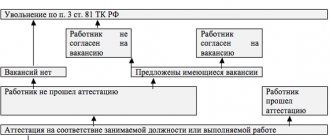On what grounds to dismiss a civil servant (terminate or terminate a service contract)
The grounds for termination and termination of a service contract are listed in Part 1 of Art. 33 of the Law on State Civil Service.
A service contract may be terminated:
- at the initiative of a civil servant;
- at the initiative of the employer’s representative;
In what cases it is impossible to dismiss on the initiative of the employer’s representative
An employee cannot be dismissed at the initiative of the employer's representative:
- during the period of his temporary incapacity for work due to injury, occupational disease or other damage to health associated with the performance of official duties, regardless of the duration of this period;
- during a period of temporary incapacity for work less than the periods specified in clause 8.1, part 1, art. 37 of the Law on State Civil Service;
- while he is on vacation;
- during pregnancy, regardless of whether the woman is on maternity leave or not;
- a woman with a child under three years old, a single mother raising a disabled child under the age of eighteen or a child under the age of fourteen;
- another person raising the children listed above without a mother;
- parent (legal representative of the child) - the sole breadwinner of a disabled child under the age of eighteen or a child under the age of three in a family raising three or more young children, if the other parent (legal representative of the child) does not work.
In the last four cases, dismissal is possible if the government agency is liquidated or the employee committed a guilty act, for example, submitted false documents when concluding an official contract.
This is indicated in Part 3 of Art. 37 of the Law on State Civil Service, Parts 1 and 4 of Art. 261, part 7 art. 11 of the Labor Code of the Russian Federation, Resolutions of the Constitutional Court of the Russian Federation dated November 22, 2011 N 25-P and dated December 6, 2012 N 31-P, paragraph 26 of the Resolution of the Plenum of the Supreme Court of the Russian Federation dated January 28, 2014 N 1.
- by agreement of the parties to the service contract;
- upon expiration of the fixed-term service contract. In some cases, such a contract can be terminated early;
- as a result of the transfer of a civil servant at his request or with his consent to another government agency or to a civil service of a different type;
- due to a civil servant’s refusal to fill another civil service position proposed for replacement due to a change in the essential terms of the service contract;
- due to a civil servant’s refusal to be transferred to another civil service position for health reasons in accordance with a medical report, or in the absence of such a position in the same government agency;
- due to the refusal of a civil servant to be transferred to another locality together with a government agency;
- due to the civil servant’s renunciation of Russian citizenship;
- due to non-compliance with restrictions and failure to fulfill obligations established by federal laws;
- for violating prohibitions related to public service.
The contract is terminated if:
- the mandatory rules of his conclusion were violated and such a violation excludes the possibility of filling the position. For example, a contract was concluded with a person who is contraindicated from performing official duties for medical reasons (clause 2, part 1, article 40 of the Law on the State Civil Service);
- Circumstances arose that were independent of the will of the parties, for example, a civil servant was convicted and the court verdict came into force (clause 1, part 2, article 39 of the Law on the State Civil Service).
Grounds for a fixed-term contract
The entire legal framework is regulated by Article 25 of Law No. 79-FZ. For any fixed-term contract that a civil servant enters into, there must be reasons that are listed:
- replacement of a person whose place and position is retained according to legislative norms;
- replacing a person temporarily absent by agreement;
- filling positions that are associated with representative offices and diplomatic missions of the Russian Federation located abroad;
- filling a temporary position;
- filling any positions in bodies that are created for an indefinite period until the assigned task is completed;
- filling any civilian position from the “assistants” category.
Almost all options are standard replacement for a position or another civil servant. Also, the bulk of fixed-term contracts are replacements for the management category. This category is not defined in the legislation. This option means any position in the territorial or regional government apparatus.
It is important to know! Any fixed-term contract can be extended an unlimited number of times.
If the contract ends or there are grounds for breaking it, then a termination procedure is carried out.
Read on the topic: Peculiarities of dismissal of municipal and civil servants from the civil service at their own request
What documents are needed to terminate the contract?
The documents required to terminate a contract depend on the grounds for dismissal. For example, when terminating a service contract:
- by agreement of the parties - prepare an additional agreement (part 5 of article 24 of the Law on the State Civil Service, clause 22 of the Model form of a service contract, approved by Decree of the President of the Russian Federation of February 16, 2005 N 159);
- on the initiative of a civil servant - receive an application from him two weeks before the day of dismissal. Exceptions are made in certain cases, for example, the retirement of a civil servant (parts 1 and 2 of Article 36 of the Law on the State Civil Service);
- at the initiative of a representative of the employer, for example, when reducing positions, prepare and deliver a notice of dismissal and receive from the civil servant a written refusal of the proposed vacant positions in the same and other government agencies (if such vacancies exist) (parts 2, 5 and 6 of Art. 31 of the Law on State Civil Service).
The Supreme Court clarified the conditions for terminating a fixed-term service contract
Photo from the website www.rstnw.ru published a 56-page overview of the practice of courts considering cases related to labor disputes of federal and municipal employees, approved by the presidium. The document analyzes the practice of courts considering cases over the past three years. The officials' claims related, among other things, to the recognition of illegal termination of a service contract, employment contract, dismissal from service on various grounds, disciplinary sanctions, transfer to another position, and collection of compensation for unused vacation.
The Supreme Court recognizes that the courts make mistakes in certain categories of disputes, and therefore, in order to eliminate them, it is necessary to pay attention to the legal positions on 17 problematic aspects of this category of cases. In particular, the Supreme Court indicates that concluding a fixed-term service contract with an official who has reached the age limit for civil service is the right of the employer’s representative, and not his responsibility.
D. filed a claim with the interdistrict Federal Tax Service to recognize the order to terminate the service contract as illegal and asked to be reinstated in the state civil service in the previously filled position.
In the statement, the woman indicated that her service contract was terminated in accordance with clause 4 of part 2 of art. 39 Federal Law “On the State Civil Service of the Russian Federation” (a civil servant reaches the age limit for being in the civil service), but she has the right to extend her service life beyond
How to issue an order (instruction) on dismissal
The need to issue an order is established in Part 2 of Art. 33 of the Law on State Civil Service.
Develop the form of the order (instruction) yourself or use the unified form N T-8, approved by Resolution of the State Statistics Committee of Russia dated January 5, 2004 N 1.
When applying the unified form, adhere to the terminology and features of the procedure for performing civil service established in the Law on the State Civil Service (Letter of the Ministry of Health and Social Development of Russia dated April 2, 2008 N 835-17).
Details on the form cannot be deleted. It is possible to supplement with new ones, but this must be formalized by an act of a government agency (paragraphs 2 and 3 of the Procedure approved by Resolution of the State Statistics Committee of Russia dated March 24, 1999 N 20).
If a civil servant goes on vacation with subsequent dismissal, then in addition to the order in Form N T-8, issue an order to grant leave in Form N T-6.
When using the developed form, everything can be included in one order.
We recommend that you indicate:
- grounds for termination of a service contract. In the future, this information will be needed to fill out the work book (clause 10 of the Rules for maintaining and storing work books);
- date of termination of the service contract. The day of termination of the service contract is the last day of service, with the exception of cases where the civil servant did not actually work, but he retained his place of work (position) (Part 3 of Article 84.1 of the Labor Code of the Russian Federation).
Upon dismissal due to the renunciation of Russian citizenship by a civil servant (Clause 12, Part 1, Article 33 of the Law on State Civil Service), the date of dismissal will be the day of renunciation of Russian citizenship or the day of acquisition of citizenship of another state (Article 41 of the Law on State Civil Service) .
When dismissed at the initiative of a civil servant and while he is on sick leave, the date of dismissal can be postponed upon his written application for the period after the end of his illness (Part 8 of Article 36 of the Law on the State Civil Service).
If you are dismissed after the end of your vacation, the day of dismissal will be the last day of your vacation (Part 13, Article 46 of the Law on the State Civil Service). In this case, it is necessary to indicate the start and end dates of the vacation, the number of days of vacation and for what period it is provided;
- details of the document that served as the basis for dismissal;
- information about the types of cash payments due to a civil servant.
The signed order must be registered . The date of registration must not be later than the date of termination of the service contract. When granting leave with subsequent dismissal, the date must be no later than the day preceding the day on which the leave begins.
Familiarize the civil servant with the order and sign it. If this is impossible to do or the civil servant refuses to sign it, then make a corresponding entry on the order (Part 2 of Article 84.1 of the Labor Code of the Russian Federation).
File the original order in the file in accordance with the nomenclature of cases established by the government agency, and a copy in the personal file of the civil servant (clause “l”, clause 16 of the Regulations on personal data of civil servants, approved by Decree of the President of the Russian Federation of May 30, 2005 N 609).
Dismissal of a civil servant in 2021: step-by-step instructions
Like any employees, government employees can be fired if there are appropriate grounds.
In this case, it is necessary to be guided not only by the norms of the Labor Code of the Russian Federation, but also by a special regulatory legal act - the Federal Law “On Civil Service”.
Public service should be understood as professional activity in the government apparatus and relevant departments.
Who are civil servants:
- Secretaries, specialists and other workers employed in government organizations.
- Officials.
- Some employees of the Ministry of Internal Affairs and the Ministry of Emergency Situations.
The civil service is divided into two types, according to ": Type Description Federal Civil Service Professional activities to ensure the powers of federal government agencies and persons holding government positions in the Russian Federation State civil service Includes the State Civil Service, the Federal State Civil Service and the civil service of the constituent entities of the Russian Federation. When a civil servant is employed, not an employment contract is concluded with him, but a service contract, which is terminated on the grounds specified in:
- At the initiative of the employer.
- Failure to comply with the terms of the contract.
- Due to transfer to another position.
- Termination of Russian citizenship of an employee.
- Agreement of the parties.
- A significant adjustment to the terms of the contract, resulting in the civil servant’s resignation from his position.
- Transfer of a government agency to another location followed by the employee’s refusal to move.
- Termination.
- At the request of the employee.
How to make payments upon termination of a contract
The financial service of the government agency, on the basis of the order, draws up a note-calculation and accrues cash payments to the civil servant.
Payment deadline
You need to pay the civil servant on the last day of service. Exceptions are cases when a civil servant did not actually work, but his place of work (position) was retained. For example, when an employee is dismissed during the period of parental leave (Part 4 of Article 256 of the Labor Code of the Russian Federation), the day of dismissal will be the date indicated by the civil servant in the resignation letter. In this case, the notice period for dismissal must be observed.
If a civil servant takes leave before leaving, the payment must be issued on the last day of work before going on leave.
This is indicated in parts 3, 4 of Art. 84.1, Art. 140 Labor Code of the Russian Federation, parts 1 and 5 of Art. 36 of the Law on State Civil Service.
What payments are due to an employee?
Upon dismissal, a civil servant is entitled to:
- salary for the period worked (part 1 of article 50 of the Law on the State Civil Service);
- payments (compensations, reimbursement of expenses) within the framework of basic and additional state guarantees (Part 10, Article 50 of the Law on the State Civil Service);
- payments that are established by federal laws or laws of constituent entities of the Russian Federation, as well as other regulatory legal acts of the Russian Federation or constituent entities of the Russian Federation (Part 10, Article 50 of the Law on the State Civil Service). For example, civil servants of the city of Moscow are provided with reimbursement of the cost of travel to and from their vacation spot, as well as compensation for unused sanatorium and resort vouchers (clauses 6 and 7, part 1, article 42 of the Moscow Law of January 26, 2005 N 3) ;
- compensation in the amount of four months' salary without payment of severance pay, which is paid in certain cases;
- monetary compensation for all unused vacations (part 13 of article 46 of the Law on the State Civil Service);
- temporary disability benefit if a civil servant is fired during a period of temporary disability or he falls ill within 30 calendar days from the date of dismissal (Part 2 of Article 5 of Law No. 255-FZ).
What payments are due when a civil servant is laid off?
If positions are reduced, the employee is entitled to the payments indicated above, as well as additional compensation:
- upon dismissal of an employee with his written consent earlier than the period specified in the notice of dismissal. The amount of compensation in this case is equal to the civil servant’s salary, which is calculated in proportion to the time remaining before the expiration of the notice period for dismissal (Part 7 of Article 31 of the Law on the State Civil Service);
- upon dismissal from government agencies located in the Far North and equivalent areas, for the fifth and sixth months from the date of dismissal. Such compensation can be paid only under certain conditions (Part 3.2 of Article 37 of the Law on the State Civil Service).
How to make an entry in the work book and personal card of a civil servant
On the day of termination of the service contract, make an entry about this in the civil servant’s work book.
The entry must be made without abbreviations and contain the exact wording from the Law on the State Civil Service and the order (instruction) on dismissal.
Certify the entry with the signature of the employee responsible for maintaining work records, the seal of the government agency and the signature of the person being dismissed.
Such rules are established in paragraphs 10, 11, 14, 15 and 35 of the Rules for maintaining and storing work books.
Duplicate the entry in the work book in the personal card of the civil servant (unified form N T-2GS (MS)) and familiarize the civil servant with the entry in the card for signature (clause 12 of the Rules for maintaining and storing work books).
Probation
Probationary period in a fixed-term contract in the civil service
When an order is signed and a fixed-term contract is concluded with a civil servant, the employer has the right to provide for a probationary period for such an employee. The period of such testing may last from three months, but should not exceed more than one year. The absence of such a norm in the administrative document on enrollment and in a fixed-term contract means that the employee was hired without testing.
What documents need to be issued to a civil servant
Employment history
The book is issued on the day of dismissal against a signature in a personal card, as well as a book recording the movement of work books and inserts in them.
If a civil servant took a vacation before dismissal, then the book is issued on the last day of service before the vacation.
This is stated in Part 4 of Art. 84.1 Labor Code of the Russian Federation, Part 5, Art. 36 of the Law on the State Civil Service and clause 41 of the Rules for maintaining and storing work books.
A delay in issuing a work book due to the fault of the employer’s representative entails the following consequences (clause 35 of the Rules for maintaining and storing work books):
- the day of dismissal is postponed, and the day the work book is issued becomes the same;
- the civil servant is compensated for the entire period of delay;
- an order is issued about the new day of dismissal and an entry is made in the work book. A previously made entry about the day of dismissal is considered invalid.
If a civil servant is absent or refuses to receive a work book, send him a notice of the need to appear for a work book or agree to send it by mail. From the date of sending the notification, the employer’s representative is released from liability for the delay in issuing the work book. Without the consent of a civil servant, a work book cannot be sent to him by mail.
This is indicated in Part 6 of Art. 84.1 of the Labor Code of the Russian Federation, clause 36 of the Rules for maintaining and storing work books.
Upon written request from a civil servant who has not received a work book after dismissal, issue it no later than three working days from the date of such request (Part 6 of Article 84.1 of the Labor Code of the Russian Federation).
Copies of documents related to civil service
These documents are issued free of charge upon written application from a civil servant. These could be, for example, copies of orders on appointment to a position, on transfers, on assignment of class rank.
Documents must be certified (part 4 of article 84.1, part 1 of article 62 of the Labor Code of the Russian Federation) and signed by an employee to avoid possible disputes.
Certificate of salary, other payments and remuneration
The certificate is prepared by an employee of the financial department of the government agency in the prescribed form. It is issued on the day of dismissal (on the last day of service before going on leave) or at the request of a civil servant after dismissal no later than three working days. This is indicated in clause 3, part 2, art. 4.1 of Law No. 255-FZ.
If it is impossible to deliver the certificate within these deadlines, you must send a notification to the civil servant about the need to appear for it or give written consent to send the certificate by mail. If the employee agrees to accept it by mail, receive written confirmation from him (clause 2 of the Procedure approved by Order of the Ministry of Labor of Russia dated April 30, 2013 N 182n).
Information for individual (personalized) accounting
This information (extracts) is also prepared by employees of the financial division of the government agency. They transfer documents with information for individual accounting to the civil servant on the day of dismissal, and copies thereof no later than five calendar days from the date of the employee’s application (clause 4 of Article 11 of the Law on Personalized Accounting).
Information for individual accounting is reflected:
- in Sect. 3 “Personalized information about insured persons” for calculating insurance premiums (Appendix No. 1 to the Order of the Federal Tax Service of Russia dated October 10, 2016 No. ММВ-7-11/);
- in the form SZV-M (information about insured persons);
- in the form SZV-STAZH (information about the insurance experience of insured persons).
Help 2-NDFL
A 2-NDFL certificate is issued to a civil servant upon his application by an employee of the financial division of the government agency (clause 3 of Article 230 of the Tax Code of the Russian Federation).
How to prepare and send information about the dismissal of a civil servant
Information about dismissal must be sent if the civil servant is subject to military registration or alimony and other amounts were withheld from him. Acts of a government agency may establish other cases in which it is necessary to send information about the dismissal of a civil servant (see, for example, paragraph 5 of Order of the State Technical Supervision Authority of the Moscow Region dated November 1, 2006 N 123-Pr).
Information for military registration
Such information is sent to the military commissariat and (or) local government body within two weeks from the date of dismissal. This is done by the employee who maintains military records in the government agency, according to the established form.
This is indicated in paragraphs. “a” clause 29 of the Methodological recommendations for maintaining military records and paragraphs. “a” clause 32 of the Regulations on military registration.
For failure to fulfill this obligation, the guilty person (representative of the employer or employee responsible for military registration work) faces a fine of 300 to 1,000 rubles. (Part 3 of Article 21.4 of the Code of Administrative Offenses of the Russian Federation).
Information about alimony and other deductions
The bailiff must be sent a copy of the writ of execution received from him, and the recoverer must be sent the copy of the writ of execution.
On them it is necessary to note the basis for the completion of the execution of the writ of execution and the amount collected. On the original writ of execution, you must also indicate for what period each collection was carried out.
This information is sent, as a rule, by an employee of the financial department of the government agency no later than the day following the day of dismissal (Part 4.1 of Article 98 of the Law on Enforcement Proceedings).
If the deductions were related to the payment of alimony, then you additionally need to send information about the dismissal, about the new place of work or residence of the debtor (if known) to the bailiff at the place of execution of the decision to collect alimony, as well as to the person receiving alimony, within three days (Clause 1 of Article 111 of the RF IC). We recommend sending both the writ of execution and the notice at the same time no later than the day following the day of dismissal.
For untimely return of a writ of execution, a fine is provided (Part 3 of Article 17.14 of the Code of Administrative Offenses of the Russian Federation):
- from 15 to 20 thousand rubles. for officials;
- from 50 to 100 thousand rubles. for a government agency as a legal entity.
How to remove a civil servant from the register
A dismissed civil servant is excluded from the register if the contract is terminated on his initiative (Part 6 of Article 36 of the Law on the State Civil Service). However, in our opinion, this is also possible in other cases, since the register should contain information only about current civil servants (Article 43 of the Law on the State Civil Service).
The procedure and period for exclusion are established by the government agency. For example, civil servants of the Russian Treasury are excluded from the register no later than the day following the day of termination of the service contract and dismissal from the civil service (clause 8 of the Procedure for organizing the maintenance of registers, approved by Order of the Russian Treasury of December 25, 2013 N 305).
Extension of a service contract with a civil servant comments
In any case, any terms of the service contract cannot worsen the official or social position of a civil servant in comparison with the conditions provided for by law. Literature: 1.
Rossinsky B.V. Administrative law: textbook / B.V. Rossinsky, Yu. N. Starilov. -4th ed., revision. and additional - M.: Norma, 2009. -928 p. 2. Federal Law No. 79 dated July 27, 2004. “On the state civil service of the Russian Federation.”
How to extend a fixed-term contract with a civil servant?
It follows from the meaning of Article 25 of Law No. 79-FZ that when hiring a person who has reached the age of 60, the employer’s representative must enter into a fixed-term service contract with him.
However, this case of concluding a fixed-term service contract is established by law only for civil servants who have reached the age of 60, and not for citizens re-entering the civil service.
Important The need to resolve the emerging issue within the legal framework is obvious.
The only opportunity at the moment to find a way out of this situation is provided by the norm contained in paragraph 8 of part 4 of article 25 of Law No. 79-FZ, according to which a fixed-term service contract is concluded not only in the cases provided for in this article, but also in other cases provided for by federal laws.
Grounds for concluding a fixed-term service contract
Attention, the Federal Law establishes a special procedure for remuneration, consisting of a salary and material incentives for the professional work activities of a civil servant, in which material incentives are provided depending on the indicators of efficiency and effectiveness of professional work activities, determined in a fixed-term service contract; in other cases provided for by federal laws. 5. With a state civil servant, with whom a service contract was concluded for an indefinite period and who has reached the age of 60 years, the specified contract is re-signed to a fixed-term service contract for a period of one to five years. This legal norm is imperative in nature, i.e. does not provide for other solutions.
in other cases provided for by federal laws. 5. With a state civil servant, with whom a service contract was concluded for an indefinite period and who has reached the age of 60 years, the specified contract is re-signed to a fixed-term service contract for a period of one to five years. This legal norm is imperative in nature, i.e. does not provide for other solutions.
Article 25. Validity period of the service contract
After the expiration of a fixed-term service contract concluded for less than five years, by agreement of the parties, a new fixed-term service contract is concluded until the civil servant reaches the age limit for being in the civil service (65 years). The duration of the contract in this case is determined by the employer’s representative, but this period cannot be less than one year.










